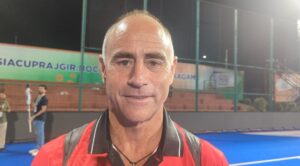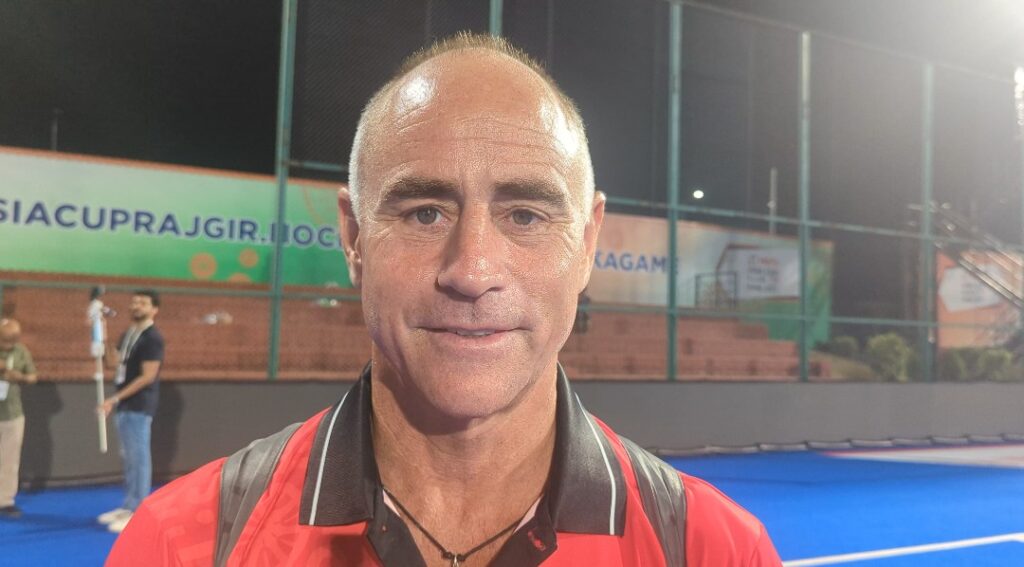
Abhishek Mishra in Rajgir
Paddy Upton, the experienced mental conditioning coach from South Africa, has played key roles in some of India’s biggest sporting achievements. He worked alongside Gary Kirsten to guide India to the 2011 Cricket World Cup title. After a decade, he helped the Indian hockey team win gold at the Asian Games in China, and a historic bronze medal at the Olympic Games in Paris.
Upton was also the guiding force behind the calmness of India’s chess prodigy, Gukesh Dommaraju, who went on to become the youngest World Chess Champion.
Having worked across 20 different sports, Upton brings deep insight into the mindset of athletes. He spoke on the sidelines after India’s 4-1 win over Malaysia in the Super 4s following a disappointing draw against South Korea. Upton shared his thoughts on Indian hockey, his experience, team fitness, approach in cricket and hockey and about Gukesh Dommaraju.
Here are the excerpts.
Q: Hi Paddy, first of all, welcome to Revsportz’s interview. India looked impressive against Malaysia, and playing back-to-back matches isn’t easy. What are your thoughts on the fitness levels of the Indian players?
Paddy : The physical fitness of this team is quite remarkable. In my two years of involvement, I haven’t seen another team in world hockey that’s fitter than us. This team is never found wanting in the fourth quarter. Kudos to Alan Tan, the fitness trainer, and Craig Fulton, who made it a priority, and of course, to the players who turn up and do the work to be this fit.
Q: After the Pro League, how did you get this team back on track, and what did you tell the boys?
Paddy: The team is building. Some new players have come in, some senior players have left, so we’re in a rebuilding phase. They had a really good camp and a strong tour to Australia, which was important in this process. Even this tournament is part of that building phase. If we go the distance with seven games, you don’t want to play every game at full intensity in this kind of heat.
Great teams, sometimes, don’t play their best but still find ways to win and this team has shown that. Going into the next two games, effectively a semi-final and final, both are must-win games. The strategy is there, the fitness is there, and hopefully, the connection and right attitude will carry them through.
Q: When results don’t go your way, like yesterday, what do you say to the team in the changing room to lift the mood?
Paddy: The reality is, there are always games or moments that don’t go a team’s way. As long as it’s not something happening repeatedly, it’s not a problem. Fans and spectators may panic, but coaches don’t. Off days happen, and every day – whether it’s a bad day or a great day – is just a learning opportunity.
That’s something Harmanpreet and Craig Fulton emphasise (on)… we must continuously learn. Whether we win or lose, the aim is to stay on an upward trajectory, through this tournament, towards the World Cup, and ultimately the Olympics in two years.
Q: You helped Gukesh win the World Championship. Do you use examples from other sports in hockey?
Paddy: Yes, I’ve worked in 20 different sports at the highest level, and I’ve discovered that the principles of mental conditioning are universal. Preparing well, having your mind in the right place, managing distractions, dealing with failures, not chasing success too hard, separating yourself from results and these principles apply everywhere. They just manifest differently in different sports and with different individuals.
Q: Are there different plans for different players? How do you address individual needs?
Paddy : There’s a team need, but also an individual need. The key is to understand each player’s unique personality – what works, what doesn’t, their distractions, their motivators. The better I understand a player, the better I can help them find their sweet spot.
Q: Recently you said India has “18 Virat Kohli’s” in the team. What did you mean by that?
Paddy : From a fitness perspective, if the Indian cricket team trained with the hockey team, I think most wouldn’t manage halfway through the session. By the end, you’d probably still have 18 hockey players going strong, with maybe only Virat keeping up with them. That’s how fit this team is.
Q: You’ve worked with both the Indian cricket team and the hockey team. What are the main differences in approach?
Paddy : They’re fundamentally different sports. Cricket is a team sport, but much of it is played individually. When batting, it’s just two players. When fielding, maybe four are involved in a play – a bowler, wicketkeeper, a fielder and someone backing up.
In hockey, all the 11 players are fully engaged for the entire 60 minutes. They must connect, run, play together, and know where everyone is at all times. Hockey is very fast paced, highly skilled, and unforgiving – mentally, technically, tactically, and physically. In cricket, there’s more margin for error. In hockey, mistakes are punished immediately.
Follow Revsportz for all the sports updates.





